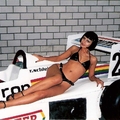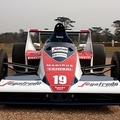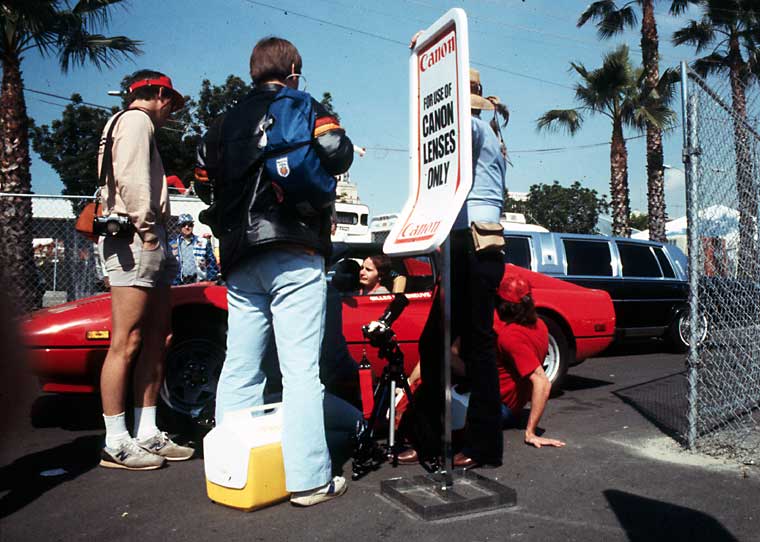At this time of year racing fans' after-dinner conversation turns to the future and, if you are above a certain age, increasingly to the past and this was how the subject of "Number 27" cropped up recently. To any Formula 1 fan of the ‘80’s and early ‘90’s, let alone a Tifoso, it causes an almost Pavlovian response because it meant at times superhuman efforts unrewarded by results, at other times results achieved which seemed impossible, sometimes tragedy but also triumph.
The records show that cars bearing the Number 27 made 378 Grand Prix starts between 1950 and 1995 and scored 25 wins. Drivers included such worthies as Jacky Ickx and Clay Regazzoni, both in Ferrari 312s, Ronnie Peterson (March 701), James Hunt (Hesketh) and Mario Andretti (Parnelli) as well as many less distinguished operators, but the story really begins with Alan Jones in 1978. Jones was a gritty and determined driver, who gave the Number its first win, carrying it until the end of 1980, when he won the World Championship and it passed onto Ferrari in part-exchange for Jody Scheckter’s No.1 from the previous year. This is where the legend really began, because in 1981 it was carried by the man with whom it will forever be associated – Gilles Villeneuve
Towards the end of his life Villeneuve said “I’ve got no intention of winning the World Championship by placing third and fourth all the time”. That philosophy of “win or bust” was eminently clear from the start of Gilles’ F1 career and was underlined by the heroic way he fought and conquered the most powerful (and initially intractable) engine in F1, the 1.5 litre V6 turbo installed in the agricultural 126C, in which he retired more often than he finished.
It now seems incredible that, although he drove in six seasons, 27 was his number for only 1½ of these, just 20 races in 1981 and the tragically truncated 1982. In that time he won 2 victories, Monaco and then Spain where it was said that “only Gilles Villeneuve could have passed Gilles Villeneuve”. The end came at Zolder in 1982, when he was killed trying to out-qualify his team-mate and bitter rival Didier Pironi. The tragedy occurred only 2 weeks after Pironi’s perceived treachery at Imola – where, for the benefit of younger readers, Pironi passed Villeneuve on the last lap in sight of the line when they were 1st and 2nd and had received a “Slow” signal (normally meaning “hold position”). Pironi later claimed there were no team orders, which team manager Marco Piccinini confirmed, further enraging Villeneuve.
A highly emotional team like the Scuderia Ferrari of the time could have been torn apart by the mixture of grief and guilt, but was held together by Villeneuve’s replacement, the debonair, charming and cosmopolitan Patrick Tambay whose driving and personal style was so different to Villeneuve. This alone won him devotees, as did his contribution to 1982 and 1983 Constructors’ Championships (Ferrari’s last until 1999). He also won two Grand Prix: a traumatic Germany the same year under the shadow of Pironi’s dreadful accident which ended his F1 career when the Championship was in sight. Tambay’s final victory for Ferrari was at Imola the following year, where he was cool under almost unbearable pressure. Incidentally, he drove 27 races for the team......
The Scuderia expressed their gratitude by replacing him by Michele Alboreto for 1984, a fighter whose famous victories for Tyrrell in the USA at Las Vegas and Detroit – the latter the final victory of the legendary DFV in 3 litre form (albeit in its second incarnation, the DFY). This man seemed suited to the culture of the Number and his place in the 27 story was cemented when he lay to rest the spectre of Zolder. The atmosphere there was not helped by a memorial to Villeneuve in the pitlane which was met with less than universal praise. His victory carrying Gilles’s number was fittingly in the final Grand Prix at the unloved circuit. For 1985, a long awaited championship seemed to be there for the taking until after 10 races with no finish lower than 3rd (albeit with 2 retirements) there came a 4th, a 13th and 4 straight retirements. Alboreto stayed with Ferrari for three more seasons, but never won again. His F1 career eventually petered out and sadly, he died testing an Audi sports car at Lausitzring in 2001.
And so to 1989; if Ferrari then had a reputation for plotting, infighting and producing sometimes difficult and occasionally impossible cars during periodic bouts of self-destruction - who better to join than a man who, in his own mind at least, had fought courageously against such things throughout his whole career? Yes, Upton-on-Severn’s finest was the next custodian of 27, and when Nigel Mansell won first time out in the 640 in Brazil, despite major reliability issues and practice woes which, in most commentators’ views ruled out a victory, Il Leone became a passionate favourite for the Tifosi. From then on, the 27 pattern was followed with either a podium or a retirement in each race, so “Our Nige” has earned his place in the legend.
In 1990, Alain Prost joined Ferrari, having won the World Championship at McLaren, and so 27 went to Ayrton Senna. There seems little point justifying the inclusion of the world’s most revered and charismatic driver in this list. As Louis Armstrong said, if you have to ask you’ll never understand.
So was Prost a ‘27’ driver? He carried the number in 1991, when No. 1 had gone straight back to Senna and McLaren, but he has little place here. He was one of the most successful drivers of all time, but how often did he make your heart leap into your mouth, or bring tears of pain or joy to your eyes? By contrast, the next man to carry the Number did all of these. Jean Alesi had both the flair and the faults to be part of our list, and like Alboreto he came from the perennial “best of an underfinanced job” Tyrrell where he drove the fantastic 019, which brought the high nose to F1. His initial impression was made in 28 and in 27 he endured (as did we) a long, frustrating drought with occasional flashes of genius.
It seems fitting that Alesi’s only F1 victory was the last for 27, in a Ferrari, in the 1995 Canadian GP, at the Circuit Gilles Villeneuve, which also seems likely to be the last-ever F1 victory for a Ferrari V12, because at the end of the season, Schuey arrived, bringing with him the No.1 from Benetton and with it the modern era to Ferrari. So 27 passed into the history books and with the F1 grid seemingly barely able to muster 20 cars next year, it seems unlikely that we will see it again, which is probably just as well, because it belongs to an era which is well and truly over.
Footnote by the Editor:
Those who have been fortunate enough to visit the Fiorano circuit may have noticed that Enzo Ferrari's house there is No.27. Maybe just a coincidence, but I wasn't sure that it had always had that number, but could find nothing on the subject. However David Seielstad provided photographic evidence which shows that the house was once No. 5. No-one seems to know when or why it was changed. Could it be the Old Man's personal and final tribute to Gilles, or was it just a romantic marketing ploy from someone at the factory?
The records show that cars bearing the Number 27 made 378 Grand Prix starts between 1950 and 1995 and scored 25 wins. Drivers included such worthies as Jacky Ickx and Clay Regazzoni, both in Ferrari 312s, Ronnie Peterson (March 701), James Hunt (Hesketh) and Mario Andretti (Parnelli) as well as many less distinguished operators, but the story really begins with Alan Jones in 1978. Jones was a gritty and determined driver, who gave the Number its first win, carrying it until the end of 1980, when he won the World Championship and it passed onto Ferrari in part-exchange for Jody Scheckter’s No.1 from the previous year. This is where the legend really began, because in 1981 it was carried by the man with whom it will forever be associated – Gilles Villeneuve
Towards the end of his life Villeneuve said “I’ve got no intention of winning the World Championship by placing third and fourth all the time”. That philosophy of “win or bust” was eminently clear from the start of Gilles’ F1 career and was underlined by the heroic way he fought and conquered the most powerful (and initially intractable) engine in F1, the 1.5 litre V6 turbo installed in the agricultural 126C, in which he retired more often than he finished.
It now seems incredible that, although he drove in six seasons, 27 was his number for only 1½ of these, just 20 races in 1981 and the tragically truncated 1982. In that time he won 2 victories, Monaco and then Spain where it was said that “only Gilles Villeneuve could have passed Gilles Villeneuve”. The end came at Zolder in 1982, when he was killed trying to out-qualify his team-mate and bitter rival Didier Pironi. The tragedy occurred only 2 weeks after Pironi’s perceived treachery at Imola – where, for the benefit of younger readers, Pironi passed Villeneuve on the last lap in sight of the line when they were 1st and 2nd and had received a “Slow” signal (normally meaning “hold position”). Pironi later claimed there were no team orders, which team manager Marco Piccinini confirmed, further enraging Villeneuve.
A highly emotional team like the Scuderia Ferrari of the time could have been torn apart by the mixture of grief and guilt, but was held together by Villeneuve’s replacement, the debonair, charming and cosmopolitan Patrick Tambay whose driving and personal style was so different to Villeneuve. This alone won him devotees, as did his contribution to 1982 and 1983 Constructors’ Championships (Ferrari’s last until 1999). He also won two Grand Prix: a traumatic Germany the same year under the shadow of Pironi’s dreadful accident which ended his F1 career when the Championship was in sight. Tambay’s final victory for Ferrari was at Imola the following year, where he was cool under almost unbearable pressure. Incidentally, he drove 27 races for the team......
The Scuderia expressed their gratitude by replacing him by Michele Alboreto for 1984, a fighter whose famous victories for Tyrrell in the USA at Las Vegas and Detroit – the latter the final victory of the legendary DFV in 3 litre form (albeit in its second incarnation, the DFY). This man seemed suited to the culture of the Number and his place in the 27 story was cemented when he lay to rest the spectre of Zolder. The atmosphere there was not helped by a memorial to Villeneuve in the pitlane which was met with less than universal praise. His victory carrying Gilles’s number was fittingly in the final Grand Prix at the unloved circuit. For 1985, a long awaited championship seemed to be there for the taking until after 10 races with no finish lower than 3rd (albeit with 2 retirements) there came a 4th, a 13th and 4 straight retirements. Alboreto stayed with Ferrari for three more seasons, but never won again. His F1 career eventually petered out and sadly, he died testing an Audi sports car at Lausitzring in 2001.
And so to 1989; if Ferrari then had a reputation for plotting, infighting and producing sometimes difficult and occasionally impossible cars during periodic bouts of self-destruction - who better to join than a man who, in his own mind at least, had fought courageously against such things throughout his whole career? Yes, Upton-on-Severn’s finest was the next custodian of 27, and when Nigel Mansell won first time out in the 640 in Brazil, despite major reliability issues and practice woes which, in most commentators’ views ruled out a victory, Il Leone became a passionate favourite for the Tifosi. From then on, the 27 pattern was followed with either a podium or a retirement in each race, so “Our Nige” has earned his place in the legend.
In 1990, Alain Prost joined Ferrari, having won the World Championship at McLaren, and so 27 went to Ayrton Senna. There seems little point justifying the inclusion of the world’s most revered and charismatic driver in this list. As Louis Armstrong said, if you have to ask you’ll never understand.
So was Prost a ‘27’ driver? He carried the number in 1991, when No. 1 had gone straight back to Senna and McLaren, but he has little place here. He was one of the most successful drivers of all time, but how often did he make your heart leap into your mouth, or bring tears of pain or joy to your eyes? By contrast, the next man to carry the Number did all of these. Jean Alesi had both the flair and the faults to be part of our list, and like Alboreto he came from the perennial “best of an underfinanced job” Tyrrell where he drove the fantastic 019, which brought the high nose to F1. His initial impression was made in 28 and in 27 he endured (as did we) a long, frustrating drought with occasional flashes of genius.
It seems fitting that Alesi’s only F1 victory was the last for 27, in a Ferrari, in the 1995 Canadian GP, at the Circuit Gilles Villeneuve, which also seems likely to be the last-ever F1 victory for a Ferrari V12, because at the end of the season, Schuey arrived, bringing with him the No.1 from Benetton and with it the modern era to Ferrari. So 27 passed into the history books and with the F1 grid seemingly barely able to muster 20 cars next year, it seems unlikely that we will see it again, which is probably just as well, because it belongs to an era which is well and truly over.
Footnote by the Editor:
Those who have been fortunate enough to visit the Fiorano circuit may have noticed that Enzo Ferrari's house there is No.27. Maybe just a coincidence, but I wasn't sure that it had always had that number, but could find nothing on the subject. However David Seielstad provided photographic evidence which shows that the house was once No. 5. No-one seems to know when or why it was changed. Could it be the Old Man's personal and final tribute to Gilles, or was it just a romantic marketing ploy from someone at the factory?
Die Nummer scheint echt verflucht zu sein. Oft wurde sie von Fahrern wie Villeneuve getragen, die Seriensieger hätten sein müssen, jedoch vom Material eingebremst wurden und immer übers Limit gingen - Vielleicht sind genau deshalb Villeneuve und Alesi Legenden für die Tifosi.
Die Geschichte mit Enzos Haus finde ich auch Interessant. Weiß hier einer mehr dazu?









 In dem Sinne, R.I.F. , Herr Villeneuve...
In dem Sinne, R.I.F. , Herr Villeneuve...